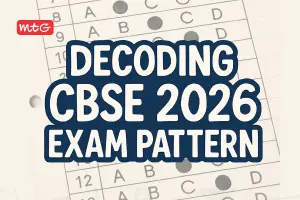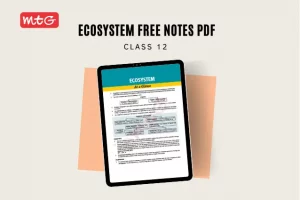The Our Environment Class 10 Science MCQ with Answers is designed according to the latest Class 10 Science syllabus. and examination pattern recommended by CBSE for Standard 10. Students can also refer to more Chapter-wise MCQs for NCERT Class 10 Science. This resource will be particularly beneficial for students aiming to achieve high marks in their academic studies, as it allows them to practice multiple-choice questions on specific subjects.
Latest – Magnetic Effects of Electric Current Class 10 Science MCQ With Solutions
Important – Class 10 Maths MCQ: Free Chapter-Wise PDFs
CBSE Class 10 Chapter 13 Our Environment MCQs
Check below the MCQ Questions for class 10 Science with answers and Clear your idea of chapter 13 Our Environment.
Q.1. The process of entry of pollutants into a food chain is known as
(a) biomass (b) biomagnification
(c) bioaccumulation (d) biosphere
Answer
Practice More – CBSE Practice Papers Class 10 (2024) – Free PDF Download
Q.2. In the food chain given below, if the amount of energy available at fourth trophic level is 3 kJ, what was the energy available at the herbivore level?
Grass → Grasshopper → Frog → Snake → Hawk
(a) 3000 kJ (b) 300 kJ
(c) 30 kJ (d) 3 kJ
Answer

Q.3. Acid rain is caused by
(a) sulphur oxides only
(b) nitrogen oxides only
(c) both nitrogen and sulphur oxides
(d) none of these
Answer
(c): Acid rain is caused by oxides of nitrogen (e.g., NO2 and NO3 ) and oxides of sulphur (e.g., SO2 and SO3 ).
Also Check – CBSE Sample Papers Class 10 for 2024 Board Exams
Q.4. In the given figure, various trophic levels are shown in a pyramid. At which trophic level minimum energy is available?

(a) T4 (b) T2
(c) T1 (d) T3
Answer
Q.5. The right path of energy flow in an ecosystem is
(a) Producer → Herbivore → Carnivore
(b) Producer → Carnivore → Herbivore
(c) Herbivore → Carnivore → Producer
(d) Herbivore → Producer → Carnivore.
Answer
Producer → Herbivore → Carnivore
Q.6. Minamata disease is due to
(a) MIC gas (b) methyl mercury
(c) lead nitrate (d) cobalt chloride.
Answer
Q.7. According to Charles Elton, which is not correct?
(a) Carnivores at the top of the pyramid.
(b) Producers at the top of the pyramid.
(c) Energy trapping is high at the top of the pyramid.
(d) Both (b) and (c)
Answer
Q.8. Which of the followings is abiotic component of an ecosystem?
(a) Producer (b) Consumer
(c) Soil and minerals (d) All of these
Answer
CBSE Class 10 Resources – Important Formula Book For 10th Science
Q.9. In a food chain usually the following are found at the third trophic level
(a) producers (b) primary consumer
(c) decomposer
(d) secondary consumer.
Answer
Q.10. In a given food chain if frog has 100 J of energy then the energy available with plants and snake respectively will be
Plants → Insect → Frog → Snake
(a) 1000 J and 10 J (b) 10000 J and 10 J
(c) 10 J and 1000 J (d) 1000 J and 100 J.
Answer
CBSE Class 10 Science Our Environment MCQs – PDF Download
Answers-
Summary for NCERT class 10 science chapter 13 – “Our Environment”
- The various components of an ecosystem are interdependent.
- The producers make the energy from sunlight available to the rest of the ecosystem.
- There is a loss of energy as we go from one trophic level to the next, this limits the number of trophic levels in a food-chain.
- Human activities have an impact on the environment.
- The use of chemicals like CFCs has endangered the ozone layer. Since the ozone layer protects against the ultraviolet radiation from the Sun, this could damage the environment.
- The waste we generate may be biodegradable or non-biodegradable.
- The disposal of the waste we generate is causing serious environmental problems.
Best Reference Books for Class 10 Science
- NCERT Textbook + Exemplar Problems-Solutions
- Foundation Course Physics, Chemistry and Biology
- NCERT at your Fingertips Science
- 100 Percent Science
- CBSE 10 Years Chapterwise Topicwise Solved Papers AKA CBSE Champion
- CBSE Chapterwise Question Bank
- CBSE Score More 15 Sample Question Papers
We hope the MCQs for the CBSE Class 10 Science Chapter 13 on Our Environment are helpful for your board exam preparation.
Keep learning and stay updated with us for more CBSE exam updates.





























